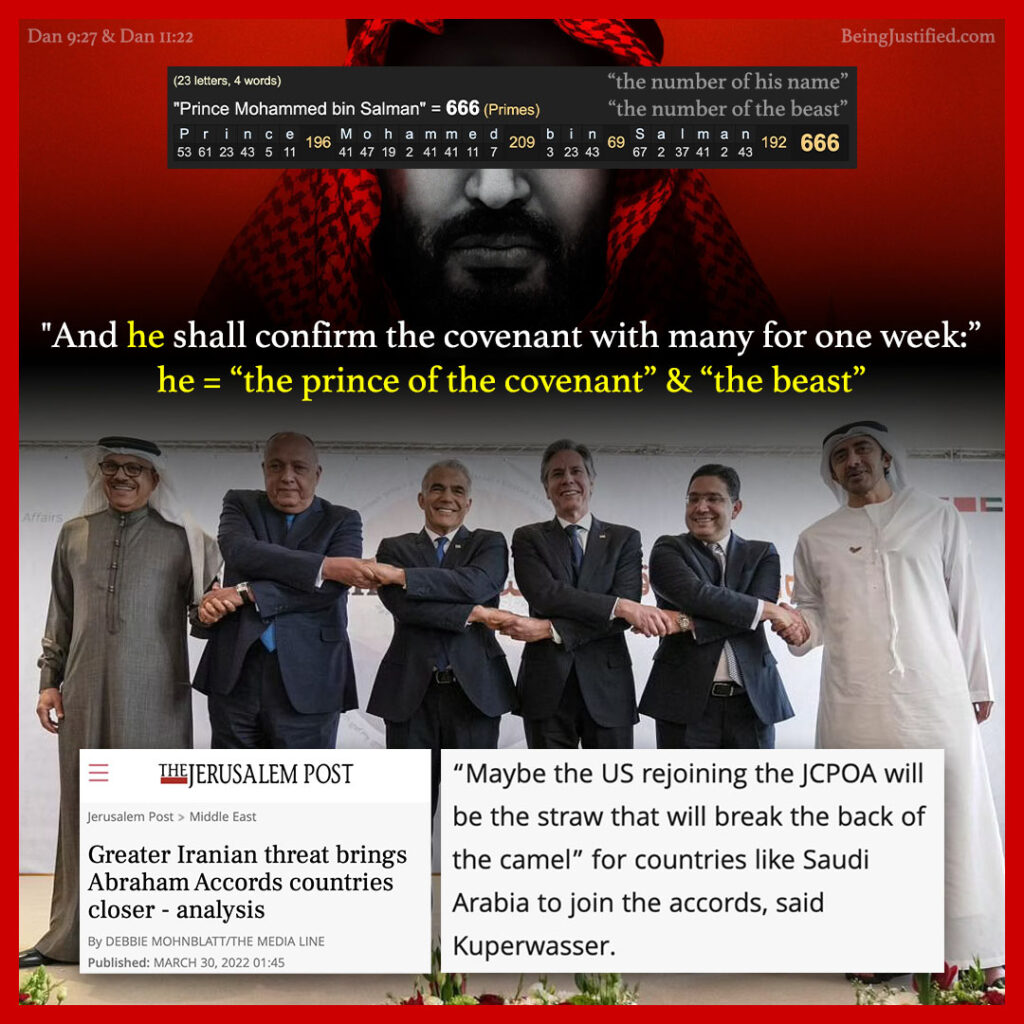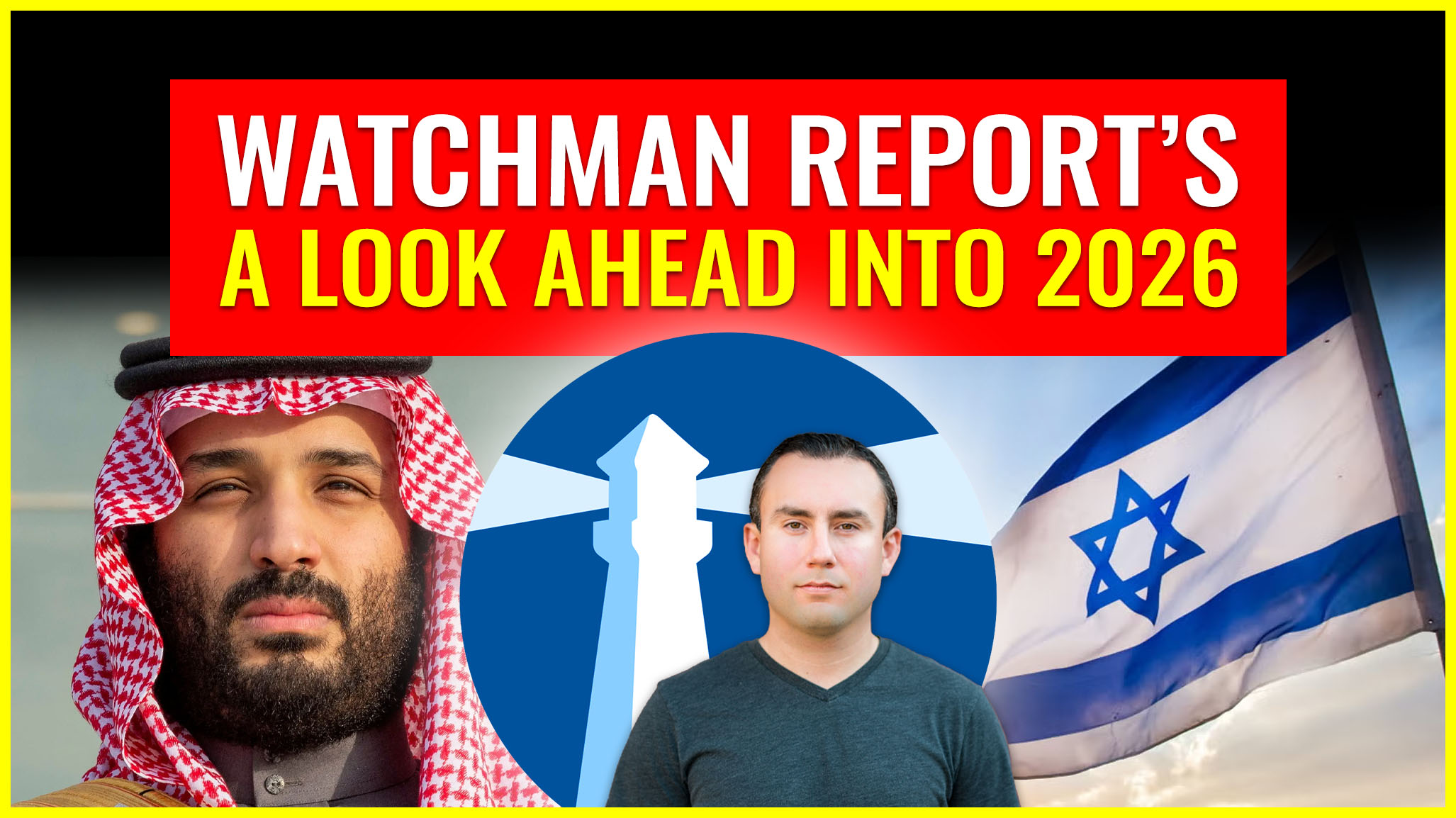PODCAST FOR THIS EPISODE:
Scripture to consider before the news:
And I stood upon the sand of the sea, and saw a beast rise up out of the sea, having seven heads and ten horns, and upon his horns ten crowns, and upon his heads the name of blasphemy. And the beast which I saw was like unto a leopard, and his feet were as the feet of a bear, and his mouth as the mouth of a lion: and the dragon gave him his power, and his seat, and great authority. And I saw one of his heads as it were wounded to death; and his deadly wound was healed: and all the world wondered after the beast. And they worshipped the dragon which gave power unto the beast: and they worshipped the beast, saying, Who is like unto the beast? who is able to make war with him?
The world will worship the beast after he is killed by a sword and yet lives 42 months after Prince Mohammed bin Salman confirms the covenant with Israel.
The groundwork is being laid right now in the gulf to unite the Abrahamic religions to worship the risen beast which the final pope will aid in.

Now unto the news: US, UAE, Israel launch team to promote interfaith dialogue.
In a joint statement evoking the Abraham Accords, the United Arab Emirates, United States, and Israel on Tuesday announced the launch of a special working team which aims to promote interfaith dialogue.
The countries behind the initiative – which is known as the Trilateral Religious Coexistence Working Group – are represented by UAE Health Minister Abdul Rahman Al Owais, Israel’s Intelligence Minister Elazar Stern, and US Under Secretary of State for Civilian Security, Democracy, and Human Rights Uzra Zeya.
“The Abraham Accords have become the most important force for positive change in the Middle East. To realize their full potential, we must reverse long-held mistrust, misconceptions, and misgivings about one another,” Al Owais said, according to a State Department press release.
The officials explained that the new group hopes to expand on the sentiment of the historic US-brokered normalization deal by supporting initiatives which promote religious tolerance and counter hatred.
“We must find new ways to encourage people-to-people engagement that bridges religions, cultures, and nationalities,” Al Owais added.
Israel’s representative, Stern, called to “widen the circle of peace, regionally and globally, through these meetings of the Abrahamic faiths to send a clear message of reconciliation, acceptance, and inclusion.”
“The Abraham Accords represent one of the most significant strategic shifts over my three decades of diplomacy in this region and bring clear-cut benefits not just to the countries and peoples concerned, but to the rest of the world as well,” US representative Zeya said.

In related news: Abraham Accords strengthened by fears over Iran’s power.
Scripture to consider:
“And he shall confirm the covenant with many for one week: and in the midst of the week he shall cause the sacrifice and the oblation to cease, and for the overspreading of abominations he shall make it desolate, even until the consummation, and that determined shall be poured upon the desolate.”
The he that will confirm the covenant with many which includes Israel is Prince Mohammed bin Salman. What is looking to draw him close to the confirmation is Iran, the boogieman controlled by that great Vatican City for the end goal of getting us into the kingdom of the beast. Don’t forget, one great city reigns over the kings of the earth today as per Revelation 17:18, and that is the Vatican. All roads lead to Rome.
Back to the news:
One of Secretary of State Antony Blinken’s goals this week as he tours the Middle East and North Africa: to ease the nerves of close U.S. regional allies reportedly angry at the Biden administration’s determination to rejoin the Iran nuclear deal.
Rejoining the deal – officially known as a Joint Comprehensive Plan of Action – is seen as a Biden administration foreign policy priority. Then-President Donald Trump backed out of the deal in 2018.
At a news conference Monday at the end of what was billed as the Negev Summit in Israel, Blinken was joined by four Arab foreign ministers, three of whom were part of the historic Abraham Accords – the United Arab Emirates, Bahrain and Morocco – as well as Egypt, which was the first Arab country to sign a peace deal with the Jewish state, in 1979.
At the conclusion of the summit, Blinken, perhaps surprisingly, hailed the success of the Trump-era accords and noted the U.S. “has and will continue to strongly support a process that is transforming this region and beyond.” Yet observers worry a U.S. return to the nuclear deal will be even more transformative to the region, but not necessarily in a positive way.
The historic Abraham Accords, brokered by the Trump administration, saw Israel sign peace deals with the United Arab Emirates, Bahrain, Morocco and Sudan. Jason Greenblatt, a central architect of the Abraham Accords, warned the United States was facing a stark choice. “Despite what was a wonderful public event at the Negev Summit, and indeed it truly was historic, important and significant, there are serious, dangerous issues lurking just beneath the surface. It is imperative that the Biden administration embrace our friends and allies in the Gulf, not sign the Iran deal, and work closely and carefully with our friends and allies there to bring stability, opportunity and safety to all. This is a battle of good versus evil, and the United States has to choose. I hope the Biden administration chooses wisely.”
Last Friday, Houthi terrorists fired missiles at a Saudi oil refinery in Jeddah, one of many recent attacks on the kingdom by the Yemen-based, Iran-backed proxy. Just last year, the Biden administration shocked some regional allies by delisting the Houthis from its terror list.
Greenblatt told Fox News Digital that the stakes were very high: “It does seem that the Biden administration is keen to enter into a deal with the devil, that is, the Iranian regime, at tremendous cost to Israel and our Arab allies. The more the U.S. fails to stand by our allies, the more our allies will seek to work together and strengthen their relationships, including through the Abraham Accords. But the Biden administration needs to pay careful attention. I am seeing now what I saw when I joined the White House in January 2017 – some of our important allies in the Gulf felt abandoned by the Obama administration and started looking to China as a new important ally. That is bad for the countries in the region, but even worse for the United States.”

Lastly in the news: Bennett denounces ‘horrific attack’ on Saudi Arabia by Iran-backed Houthis.
In an unusual condemnation, Prime Minister Naftali Bennett on Saturday denounced an attack launched the previous day by Yemen’s Houthi rebels on Saudi Arabia’s capital Riyadh and the Red Sea port city of Jeddah.
Among the sites targeted in the wave of Houthi drone and missile attacks on Friday was an oil plant that was set ablaze near the Formula One race in Jeddah, marking the rebel’s highest-profile assault yet on the kingdom.
The Houthis claimed to have hit “vital facilities in Riyadh,” but the damage to the Saudi capital was unclear.
“The State of Israel expresses its sorrow to the Kingdom of Saudi Arabia after the horrific attack by the Iranian-backed Houthis,” Bennett said in a statement.
“This attack is further proof that Iran’s regional aggression knows no bounds and reinforces the concern of Iran’s IRGC being removed from the FTO list,” he added, referring to reports the US is considering delisting the Islamic Revolutionary Guard Corps as a foreign terror group as part of a nuclear agreement with Iran.
Bennett’s statement came ahead of his meeting Sunday with US Secretary of State Antony Blinken, during which the two are expected to discuss the possible US return to the 2015 nuclear deal with Iran, a move Israel opposes.
The nation of Israel is getting openly closer to Saudi Arabia along with Prince Mohammed bin Salman openly saying Israel can be potential ally recently. We are almost at the point that the covenant will get confirmed by MBS and this world will plunge into the last days and more specifically, Israel’s final prophetic 70th week.





